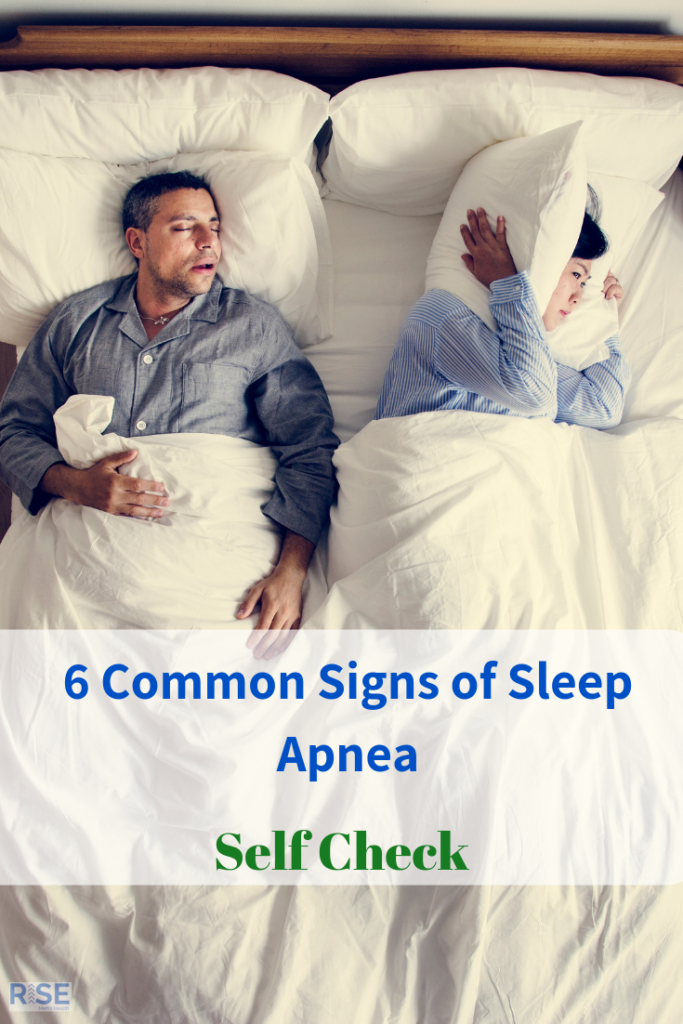
6 Common Signs of Sleep Apnea: Self Check
At least 40 million Americans suffer from chronic, long-term sleep disorders each year. The majority of these conditions can result in sleep apnea, which interferes with work, driving, and academics.
What is Sleep Apnea
Sleep apnea is a common disorder in which you have intermittent breathing disturbances while you sleep. These breathing pauses can last anywhere from a few seconds to several minutes. They might occur 30 times or more in an hour. Typically, normal breathing starts again, oftentimes with a loud choking sound or snort.
As a result of these breathing interruptions, the quality of your sleep is poor, which leads to a host of other consequences such as:
- Daytime fatigue
- Irritability
- Morning headache
- Difficulty paying attention while awake
- Insomnia (difficulty staying asleep)
- Awakening with a dry mouth
If sleep apnea is left untreated, there are health complications that may arise:
- Weight gain & Obesity
- Diabetes
- Hypertension
- Impotence
- Arrhythmia (irregular heart beat)
- Stroke
Our Quick Self Check below to determine whether you have a sleep disorder and are in need of further care.
Are you struggling to Breathe when you are sleeping?
Even if you don’t THINK you have a problem, take this quick self check:
- Do you SNORE?
- Are you TIRED during the day?
- Has anyone seen you CHOKING or GASPING when you sleep?
- Have you been told you have HIGH BLOOD PRESSURE?
- Do you have ACID REFLUX?
- Do you have DIABETES?
If you answered YES to more than TWO of the questions give us a call at (817) 900-0304 or schedule an appointment to talk about home sleep testing.
Testing for sleep apnea is convenient and easy with an at-home sleep study.
After discussing symptoms at your appointment, our sleep technician will check your insurance benefits and set up a time to pick up the machine. There are three items that you need to wear while you rest: a chest belt, a finger probe, and a nose cannula.
We accept Texas Health insurance Or if you want to use your Health or Flexible Savings Account (HSA or FSA) – The Self-Pay costs is: $175.00
You results and diagnosis next day:
- The sleep tech will go over setting up the machine and how to conduct the test and send it home with you.
- Bring the machine back the next morning and the results will be sent to a physician for interpretation.
- From there, we can determine what the best treatment option will be.
CPAP
Continuous positive airway pressure therapy uses a machine to help a person who has obstructive sleep apnea (OSA) which is the most common form of sleep apnea. A CPAP machine increases air pressure in your throat as you’re sleeping so that your airway doesn’t collapse when you breathe in.
Obstructive sleep apnea can be considered one of three levels depending on your frequency of sleep interruptions in breathing:
- Mild OSA– experiences 5-14 episodes of interruptions in breathing in an hour.
- Moderate OSA- experiences 15-30 episodes of interruptions in breathing in an hour.
- Severe OSA- experiences 30 or more interruptions in breathing in an hour.
Surgery
Involves removing and repositioning excess tissue in the throat to increase the width of the airway. Uvulopalatopharyngoplasty, or UPPP is a surgery to open the upper airways by taking out extra tissue in the throat and other soft palate procedures.
It is the go-to type of surgery for sleep apnea.
Oral Appliance Therapy
These are convenient and portable, and not only do they treat sleep apnea, they are effective to stop snoring. Mandibular Advancement Devices (MAD) are sleep apnea mouthpieces that are custom-crafted using a plastic-like mold that forms to the shape of the patient’s teeth and mouth.
If you answered YES to more than TWO of the questions give us a call at (817) 900-0304 or schedule an appointment to talk about home sleep testing.
Test Your Test For FREE!
Get the 15 question Test Your Test Low T History Quiz and get started on a Personalized strategy to RISE Low Testosterone!
This article is for informational purposes only and does not constitute medical advice. The information contained herein is not a substitute for and should never be relied upon for professional medical advice. Always talk to your doctor about the risks and benefits of any treatment.
Medically peer reviewed by Dr. Kenneth LeCroy, MD. Written by Our Editorial Team.

Having read this I believed it was extremely enlightening. I appreciate you taking the time and effort to put this short article together. I once again find myself spending way too much time both reading and commenting. But so what, it was still worthwhile!